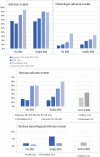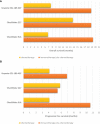Immunotherapy in NSCLC Patients With Brain and Leptomeningeal Metastases
- PMID: 35494085
- PMCID: PMC9039308
- DOI: 10.3389/fonc.2022.787080
Immunotherapy in NSCLC Patients With Brain and Leptomeningeal Metastases
Abstract
Immunotherapy has now been integrated as a treatment strategy for most patients with non-small cell lung cancer (NSCLC). However, the pivotal clinical trials that demonstrated its impressive efficacy often did not include patients with active, untreated brain metastases or leptomeningeal carcinomatosis. Nevertheless, NSCLC is the most common tumor to metastasize to the brain, and patients develop brain and meningeal involvement in approximately 40 and 10% of cases, respectively. Consequently, the appropriate care of these patients is a recurrent clinical concern. Although there are many aspects that would merit further investigation to explain the mechanism of intracranial response to immune checkpoint inhibitors (ICPs), some data suggest that they are able to cross the blood-brain barrier, resulting in local tumor microenvironment modification. This results in a similar clinical benefit in patients with stable, previously treated brain metastases compared to the general population. Despite important limitations, some real-life studies have described that the ICPs' efficacy was maintained also in less selected patients with untreated or symptomatic brain metastases. In contrast, few data are available about patients with leptomeningeal carcinomatosis. Nevertheless, neurological complications due to ICP treatment in patients with brain metastases have to be evaluated and carefully monitored. Despite the fact that limited data are available in the literature, the purpose of this review is to show that the multimodal treatment of these patients with brain metastases and/or leptomeningeal disease should be discussed during tracing of the history of the disease, participating in the local and possibly systemic control of NSCLC.
Keywords: brain; immunotherapy; leptomeningeal; lung cancer; metastases.
Copyright © 2022 Pierret, Giaj-Levra, Toffart, Alongi, Moro-Sibilot and Gobbini.
Conflict of interest statement
The authors declare that the research was conducted in the absence of any commercial or financial relationships that could be construed as a potential conflict of interest.
Figures



References
-
- Hendriks LE, Derks JL, Postmus PE, Damhuis RA, Houben RMA, Troost EGC, et al. Single Organ Metastatic Disease and Local Disease Status, Prognostic Factors for Overall Survival in Stage IV Non-Small Cell Lung Cancer: Results From a Population-Based Study. Eur J Cancer (2015) 51:2534–44. doi: 10.1016/j.ejca.2015.08.008 - DOI - PubMed
Publication types
LinkOut - more resources
Full Text Sources
Other Literature Sources

